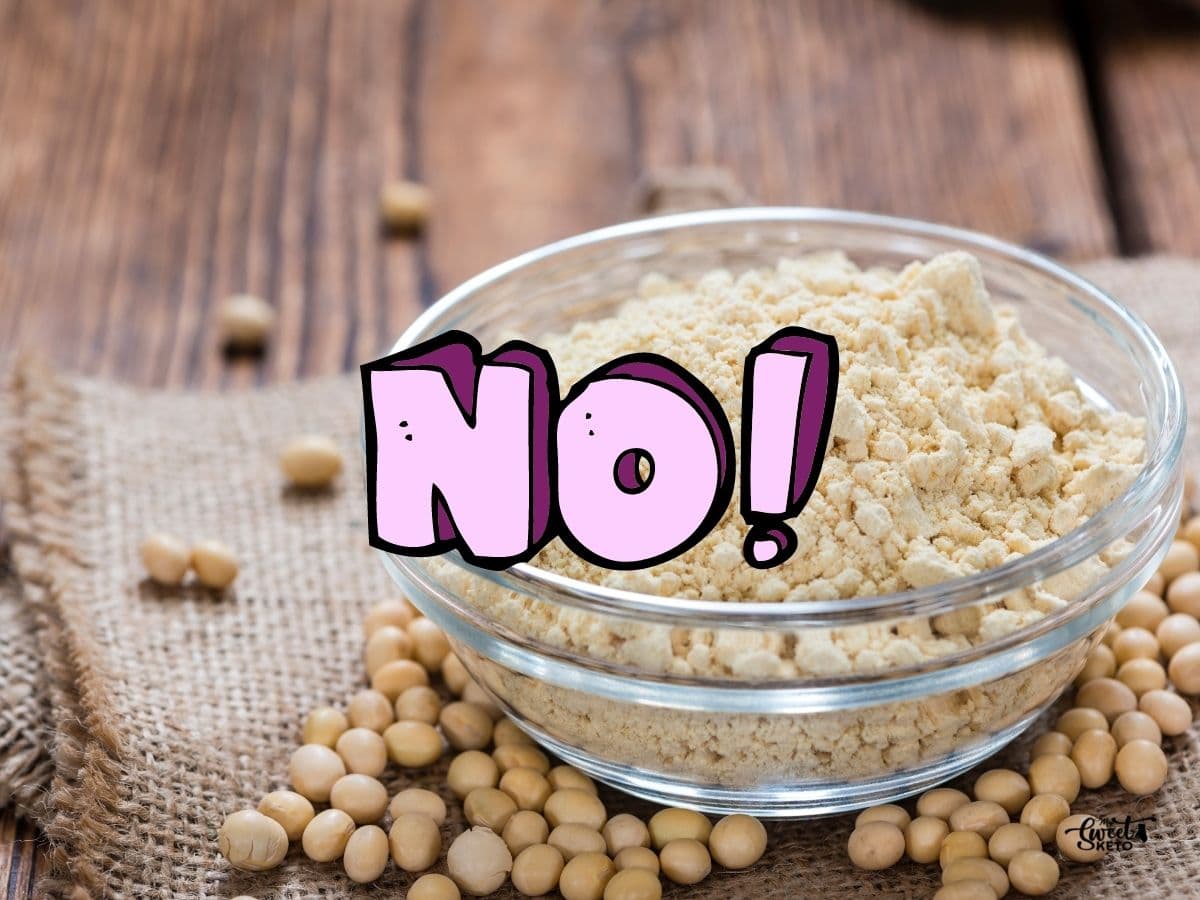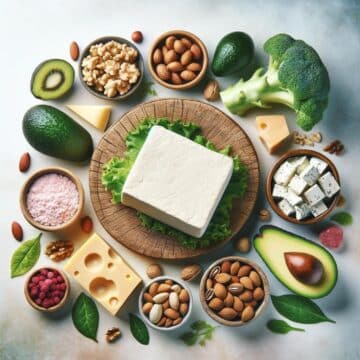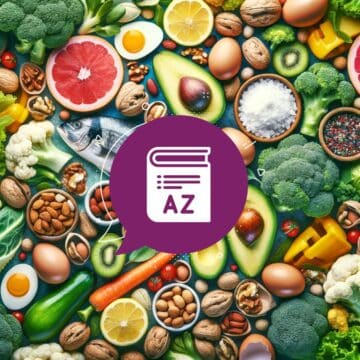Once you go keto, one of the first things to abandon is cereal flours and foods made with them (e.g., bread, pasta, cookies).
That’s because cereals are high in carbs, and keto is by default a low-carb diet. In fact, some cereals contain up to 75% of this ketosis-blocking nutrient [1]! Refined flours even more so with the water and other components removed.
But because our favorite meals are based on flour — think pasta, croissants, pizza, muffins, and tacos — keto eaters have found a way to never miss out on all these fun meals: Nut flours! Specifically, almond flour and coconut flour, which are the mainstay of keto baking and pastry making.
However, there is a whole world of wheat flour alternatives out there that keto eaters are trying to explore.
If you, too, are bored with the same old almond and coconut flour meals, you need to know what is and what is not keto-friendly on the flour market.
With that said, here's a list of non-keto flours that you need to avoid on this low-carb lifestyle.
6 Non-Keto Flours that You Need to Avoid
1. Wheat (and other cereals)
Wheat, rice, barley, oat, and other cereal flours are a big NO on the keto diet.
As already said, they’re high in carbs, specifically digestible starches such as amylose. Starches like these are normally the main source of energy in most people’s diets. But once you limit their intake to less than 50g per day — as is recommended on the keto diet — the body can enter ketosis. Unfortunately, keeping your intake this low while eating foods made with cereal flour isn’t really feasible.
2. Chickpea
A fairly common assumption is that chickpea flour can be used on the keto diet.
That’s probably because chickpea flour, also known as besan or gram flour, is lower in carbs than cereal flour. That may certainly make it a great alternative on other low-carb and moderate-carb diets, but not on keto. A small, 1 oz serving of chickpea flour has as much as 13g of net carbs [2]. That’s 26% of the upper 50g/day carb limit most keto eaters follow. And besides, chickpeas are a legume, and we already know most legumes are not compatible with keto dieting. So stick to almond flour for your low-carb pancake making!
3. Soy
Another legume-based flour some say is keto-friendly but really isn’t is soy flour.
Soy is unusually high in protein, with up to 55% of its dry weight being protein [3]. Its high protein count could be a reason people consider it a great low-carb alternative to wheat flour. But soy flour is also 30% carbohydrates, and a ¼ cup will have around 5g net [4]. While that doesn’t seem like much, the carbs can easily add up if you’re not careful. That can especially prove to be the case when you need to use a lot of flour in a recipe.
4. Gluten-free
Another common misconception is that gluten-free means carb-free.
That couldn’t be further from the truth! Many gluten-free flours are actually made from cereals that simply don’t contain gluten, like amaranth, rice, quinoa, and similar. Others contain flour blends, usually a combo of bean and cereal flours. But there are also those gluten-free flours that are coincidentally low in carbs and that have gotten many people confused. Read the label to check the ingredients and carb count before buying, and you won’t go off track.
5. Cassava
It usually goes without saying: flours made from root veggies are not keto.
The only exception to this rule is konjac flour, which is composed mostly of indigestible starches that don’t raise blood glucose levels [5]. But it’s definitely not true for cassava flour. This starchy flour is a great gluten-free alternative to wheat flour but not a good alternative on keto. Cassava, or yuca as it’s sometimes called, provides most of its calories in the form of digestible carbohydrates [6]. So avoid cassava and other root veggie flours, and you won’t go overboard with your carb intake.
6. Buckwheat
Buckwheat is a type of pseudocereal best know as being the main ingredient of soba noodles.
Pseudocereals are not real cereals but (usually) seeds people use in the same way as cereals. Buckwheat products, like buckwheat flour, are also known to be healthy for people with diabetes because they help lower blood glucose levels and attenuate insulin resistance [6]. But despite not being cereal and being diabetic-friendly, it’s still not keto. Buckwheat is high in carbohydrates, with 60% of its dry weight being carbs [7].
Final Thoughts
Variety is the spice of life, and that’s why you don’t want to limit your choice of keto-friendly flours. But don’t get fooled by false claims when picking alternative flours for your keto baking adventures.
Some of the above flours are well-known keto no-no’s, while others are falsely touted as keto alternatives.
The above examples are just a few things to keep in mind. But if you really want to play things safe, looking at the ingredients list and Nutrition Facts label before making a purchase can help you decipher the keto from the non-keto flours.
References:
- McKevith B. Nutritional aspects of cereals. Nutrition Bulletin, 2004; 29: 111-142. https://doi.org/10.1111/j.1467-3010.2004.00418.x
- Nutrition Data website. Accessed Aug 2021. https://nutritiondata.self.com/facts/legumes-and-legume-products/4406/2
- Grieshop CM, Kadzere CT, Clapper GM, et al. Chemical and nutritional characteristics of United States soybeans and soybean meals. J Agric Food Chem. 2003;51(26):7684-7691. doi:10.1021/jf034690c
- U.S. Department of Agriculture. Agricultural Research Service. FoodData Central. Soy flour, full-fat, raw. Apr 2019. https://fdc.nal.usda.gov/fdc-app.html#/food-details/174273/nutrients
- U.S. Department of Agriculture. Agricultural Research Service. FoodData Central. Cassava, raw. Apr 2019. https://fdc.nal.usda.gov/fdc-app.html#/food-details/169985/nutrients
- Huang CY, Zhang MY, Peng SS, et al. Effect of Konjac food on blood glucose level in patients with diabetes. Biomed Environ Sci. 1990;3(2):123-131. https://pubmed.ncbi.nlm.nih.gov/1966003/
- Qiu J, Liu Y, Yue Y, Qin Y, Li Z. Dietary tartary buckwheat intake attenuates insulin resistance and improves lipid profiles in patients with type 2 diabetes: a randomized controlled trial. Nutr Res. 2016;36(12):1392-1401. doi:10.1016/j.nutres.2016.11.007












Greg Wright says
What flours are keto friendly - is there a complete list available please
Luka says
Thanks for your comment! I can definitely help answer your question about keto-friendly flours. While there is no definitive or exhaustive list of keto-friendly flours, there are several options that are commonly used in low-carb and keto baking.
If you're interested in learning more about keto flours and how to use them in your baking, we have a great article on our website that goes into more detail. You can find it here: https://www.mysweetketo.com/keto-flours/. We hope you find this helpful!
Beth says
I agree with your list. However Almond flour is not a good option for me for several reasons. I developed stones from eating almond flour, a well known risk and texture is generally heavy. I don't like the texture of coconut flour as an alternative. I've been experimenting with Oat Bran and Vital Wheat Gluten. What are your thoughts on these? Thank you in advance.
Tisa says
Yeah, everyone has to find what fits them best. And I do, generally think that moderation is key in everything, including almond flour.
Anyhow, gluten is a big no-no for me due to health reasons and a total no-no for most of the ketoers. Both of the options you are listing are not exactly keto, so I cannot say I'd recommend any for the keoters who come to my site and use my recipes.
On the other hand, oat bran is a seemingly very good carb option for those who don't limit their carb intake to stay in ketosis.
So, if I am someone who is not keto all of the time, and accepts some grains every now and then, oat bran for breakfast sounds OK.